|
|
|
Sort Order |
|
|
|
Items / Page
|
|
|
|
|
|
|
| Srl | Item |
| 1 |
ID:
188817
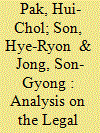

|
|
|
|
|
| Summary/Abstract |
The 1969 Vienna Convention on the Law of Treaties is a fundamental treaty providing rights and obligations that states assume in the conclusion and implementation of treaties. Some of the provisions of the Convention, however, continue to divide the legal scholarship. One of them concerns the legal definition of jus cogens provided in Article 53 of the Vienna Convention on the Law of Treaties. The international community, particularly the International Law Commission, has exerted strenuous efforts for a long time to reach a consensus on jus cogens. Nevertheless, the legal definition of jus cogens is still open to varying interpretation among different countries and international publicists.
In this light, the article analyses the legal definition of jus cogens in three aspects. First, the connotation of the concept ‘peremptory norms of general international law’ is assessed in terms of particular, general and universal international law. Second, it analyses some problems arising in understanding the non-derogability from and modifiability of jus cogens. Finally, the article discusses some issues regarding ‘acceptance and recognition’ of jus cogens by the ‘international community of states as a whole’.
|
|
|
|
|
|
|
|
|
|
|
|
|
|
|
|
| 2 |
ID:
107084
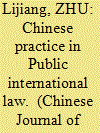

|
|
|
|
|
| Publication |
2011.
|
| Summary/Abstract |
This survey covers materials reflecting Chinese practice in 2010 relating to: I. Fundamental principles of international law (Five principles of peaceful coexistence; Rule of law at the national and international levels); II. International law of treaties (Effects of armed conflicts on treaties; Mr. HUANG Huikang elected as member of the International Law Commission (ILC); China-DPRK Treaty of Friendship, Cooperation and Mutual Assistance); III. China's territorial integrity (China's core interest; Taiwan; Tibet; Diaoyu Island and its affiliated islands; Xisha Islands; Nansha Islands); IV. International law of the sea (General position; Development of the Chunxiao oil and gas field in the East China Sea; Military activities in the Yellow Sea; Freedom of navigation in the South China Sea; Nature of the Douglas Reef (Okinotori Reef); Somali piracy); V. International law on civil aviation (Beijing Convention and Protocol on Aviation Security); VI. International human rights law (General position on human rights; Racism and self-determination; Human organ transplantation; Freedom of information; Call for repatriation of Uighur terrorist suspects in Guantanamo to China; Expulsion of aliens; North Korean asylum seekers; UN High Commissioner for Refugee (UNHCR); Human Rights Council; Implementation of human rights instruments); VII. International humanitarian law (Protection of civilians in armed conflicts; Occupied Arab territories; Humanitarian assistance; The 1972 Sino-Japan Joint Statement); VIII. International law on disasters (Protection of persons in the event of disasters); IX. International law on arms control, disarmament and non-proliferation (General position; Ratification of CCW Protocol on Explosive Remnants of War); X. International criminal law (The International Criminal Court (ICC); The Bashir case; Scope and application of universal jurisdiction; Measures to eliminate international terrorism; Ratification of the International Convention for the Suppression of Acts of Nuclear Terrorism; Bilateral treaty on extradition with Indonesia; The Park Joo-tark extradition case; Hacking and other cyber attack; Transnational organized crime; International drug control; Anti-corruption); XI. International environmental law (Climate change; Prevention of transboundary harm from hazardous activities and allocation of loss in the case of such harm; Use of water resources of Mekong River); XII. International law on diplomatic and consular relations (Vienna Convention on Diplomatic Relations and Vienna Convention on Consular Relations; Responsibility of States to ensure protection of diplomatic personnel and premises; Diplomatic asylum; Ratification of bilateral consular agreements with the Philippines and Cambodia; The Rio Tinto case and bilateral consular agreement with Australia); XIII. International law on international organizations (Role of UN and its reforms; UN peacekeeping operations; Regional cooperation of Northeast Asia); XIV. International law on settlement of disputes (Shelling of Yeonpyeong Island incident; International Court of Justice (ICJ); Kosovo advisory case before the ICJ; Ms. XUE Hanqin Elected as Member of the ICJ).
|
|
|
|
|
|
|
|
|
|
|
|
|
|
|
|
| 3 |
ID:
155107


|
|
|
|
|
| Summary/Abstract |
The article examines the recent debate between the experts of the Asian-African Legal Consultative Organization and the International Law Commission on the identification of Customary International Law in light of the marginal role that the Third World has played in customary law-making. During the decolonization period, recently independent states and their scholars were quite resistant towards customary law. This cautious stance is justified by the central role of power in the formation of customary rules. Though the doctrine of sources underwent significant reforms during this chapter, recent developments such as the acceleration of custom, the greater role of international organizations and the persistent objector doctrine have not been able to alter this undemocratic bias. Therefore, one should be aware of these limitations when engaging CIL from a Third World perspective.
|
|
|
|
|
|
|
|
|
|
|
|
|
|
|
|
| 4 |
ID:
158325
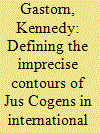

|
|
|
|
|
| Summary/Abstract |
The concept of jus cogens or “peremptory norms” is not new to students and practitioners of international law, but the practical identification and application of jus cogens norms is not without its own set of disagreements and debate. The purpose of this paper is to identify some of the details of the development of the common understanding of jus cogens within international law, with particular emphasis on the Asian-African perspective, and to outline the work of the International Law Commission (ILC) on the topic since its inclusion on the ILC’s work programme in 2015.
|
|
|
|
|
|
|
|
|
|
|
|
|
|
|
|
| 5 |
ID:
113310


|
|
|
|
|
| Publication |
2012.
|
| Summary/Abstract |
In November 2002, a man with 'atypical pneumonia' treated in Foshan hospital, Guangdong Province, in the People's Republic of China, was the first known case of Severe Acute Respiratory Syndrome (SARS). However, it was not until April 2003 that the Chinese government admitted to the full scale of 'atypical pneumonia' cases infected with SARS, two months after the disease had rapidly spread across the world with initial infections in Hong Kong and Vietnam sourced to Guangdong. In 2008, Zimbabwe experienced one of the biggest outbreaks of cholera ever recorded. By February 2009, the disease had spread across all of Zimbabwe's 10 provinces and to neighbouring countries-Botswana, South Africa, Zambia and Mozambique-causing thousands of infections amongst their populations. This article seeks to examine what duties the Chinese and Zimbabwe states had to protect their citizens and the international community from these outbreaks. The article refers to the findings of the International Law Commission's study into the role of states and international organisations in protecting persons in the event of a disaster to consider whether there is an international duty to protect persons from epidemics. The article concludes that both cases reveal a growing concept of protection that entails an international duty to assist individuals when an affected state proves unwilling or unable to assist its own population in the event of a disease outbreak.
|
|
|
|
|
|
|
|
|
|
|
|
|
|
|
|
| 6 |
ID:
188224


|
|
|
|
|
| Summary/Abstract |
In August 2021, Pacific Islands Forum Leaders issued the Declaration on Preserving Maritime Zones in the Face of Climate Change-Related Sea-Level Rise (PIF Declaration), declaring their intention that their maritime zones, and rights and entitlements flowing from those zones, would be maintained notwithstanding the effects of sea-level rise. This article offers a commentary on the PIF Declaration in the context of scholarly debate on sea-level rise implications for baselines and maritime zones, and in light of its historical lineage. The PIF Declaration’s significance lies in giving prominence to a package of state practice, comprising the establishment of maritime zones using fixed methods, their notification to the international community, and their maintenance over time. The article examines evidence of such practice among PIF members, and considers how such practice advances the PIF Declaration’s claim that the preservation of maritime zones may be achieved through the interpretation and application of the UN Convention on the Law of the Sea.
|
|
|
|
|
|
|
|
|
|
|
|
|
|
|
|
| 7 |
ID:
154164
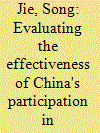

|
|
|
|
|
| Summary/Abstract |
In the process of drafting and adopting international legal documents, each participating state should ensure its participation is effective, i.e. it should ensure that its views and national interests are incorporated. However, this article argues that China's participation in the activities of the International Law Commission as well as at the International Court of Justice has not been effective, in contrast to the practice of the United Kingdom and the United States. In order to be a true leader in international affairs that has the capability to influence the course of legal developments, China should improve the quality and extent of its participation.
|
|
|
|
|
|
|
|
|
|
|
|
|
|
|
|
| 8 |
ID:
176053


|
|
|
|
|
| Summary/Abstract |
Continuing its work on the sources of international law, the International Law Commission decided, at its seventieth session, to include the topic “General principles of law” in its current programme of work. By taking up the topic, the Commission aims to shed light on various aspects of this source and provide guidance to States, international organizations, courts and tribunals and all others that may be called upon to deal with general principles of law. The present article provides an overview of the first debate on the topic that took place within the International Law Commission and the Sixth (Legal) Committee of the UN General Assembly in 2019, focusing on certain key issues that will be central to the treatment of the topic.
|
|
|
|
|
|
|
|
|
|
|
|
|
|
|
|
| 9 |
ID:
128591
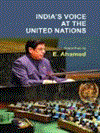

|
|
|
|
|
| Publication |
DelhI, Blackwell, 2013.
|
| Description |
lxxiii, 136p.Hbk
|
| Standard Number |
9789380574394
|
|
|
|
|
|
|
|
|
|
|
|
Copies: C:1/I:0,R:0,Q:0
Circulation
| Accession# | Call# | Current Location | Status | Policy | Location |
| 057661 | 320.95405/IND 057661 | Main | On Shelf | General | |
|
|
|
|
| 10 |
ID:
157288
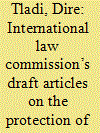

|
|
|
|
|
| Summary/Abstract |
This article concerns the ILC’s Draft Articles on the Protection of Persons in the Event of Disasters and, in particular, the establishment of a rights-duties relationship between States concerning the right to accept or refuse assistance from third States (horizontal rights-duties relationship). The article assesses the merits of the horizontal rights-duties relationship by assessing the two primary justifications for the proposition. The first justification is that the proposition reflects the law as it currently stands. The second justification is that, independent of whether the proposition reflects current law, it is morally required in order to save lives and protect the dignity of persons affected by disasters. The assessment is undertaken, principally, on the basis of the materials relied upon in the commentary to the Draft Articles as well as deliberations within the ILC itself.
|
|
|
|
|
|
|
|
|
|
|
|
|
|
|
|
| 11 |
ID:
044645
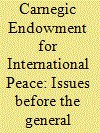

|
|
|
|
|
| Publication |
New York, Carnegic Endowment for International Peace, 1970.
|
| Description |
187p.
|
| Contents |
Vol 5 : 1963-1965
|
| Standard Number |
0405012306
|
|
|
|
|
|
|
|
|
|
|
|
Copies: C:5/I:0,R:0,Q:0
Circulation
| Accession# | Call# | Current Location | Status | Policy | Location |
| 004957 | 341.2322/CAR 004957 | Main | On Shelf | General | |
| 004958 | 341.2322/CAR 004958 | Main | On Shelf | General | |
| 004959 | 341.2322/CAR 004959 | Main | On Shelf | General | |
| 004960 | 341.2322/CAR 004960 | Main | On Shelf | General | |
| 004961 | 341.2322/CAR 004961 | Main | On Shelf | General | |
|
|
|
|
| 12 |
ID:
185642
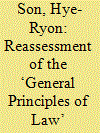

|
|
|
|
|
| Summary/Abstract |
Currently, there exist several academic and legal questions on which common perception is not established among states. One of them concerns the interpretation of ‘general principles of law’ mentioned in Article 38(1)(c) of the Statute of the International Court of Justice. Variance in the interpretation of ‘general principles of law’ manifests itself mainly in controversies over whether they are principles of domestic law or international law and over the implication of ‘civilized nations’ that qualifies ‘general principles of law’. The article aims at analysing such divergent views surrounding ‘general principles of law’ and voicing the authors’ view on the matter. By examining the principles in comparison with international conventions and custom, and in terms of wordings employed in the relevant provisions, the article attempts to demonstrate that they must be viewed as principles shared by national law systems of certain states. It also argues that in view of the essential characteristics of international law, and in terms of the meaning of the term ‘civilized nations’, ‘general principles of law’ cannot be deemed a universal source of international law, and in particular, that since the phrase ‘civilized nations’ was not intended to include all states in the world, it is necessary to amend the relevant wording.
|
|
|
|
|
|
|
|
|
|
|
|
|
|
|
|
| 13 |
ID:
126070
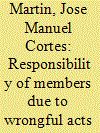

|
|
|
|
|
| Publication |
2013.
|
| Summary/Abstract |
While for the most part the attribution hypothesis raised by the International Law Commission (ILC) in its articles on the responsibility of international organizations are still purely theoretical, the eventual subsidiary responsibility of the members is marked by a high degree of importance which also counts on numerous precedents. In this alleged scenario, the attributable responsibility of the members would exclusively arise under its membership condition vis-à-vis the international organization-without considering any type of help, assistance, execution, control or coercion exercised by the international organization in the perpetration of the wrongful act. This paper aims to study this subject by conducting a thorough analysis of the theories addressing this issue which have been elaborated over time, the case law, the private codifications and the political arguments set out in the doctrine. All of this will be confronted with the articles adopted by the ILC in 2011. Finally, this study will conclude by assessing whether members are obliged to provide funding so as to enable the organization to fulfil its obligations of repairing the damage caused by the wrongful act.
|
|
|
|
|
|
|
|
|
|
|
|
|
|
|
|
| 14 |
ID:
097081
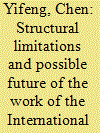

|
|
|
|
|
| Publication |
2010.
|
| Summary/Abstract |
The article offers a theoretical response to the current identity crisis of the International Law Commission (ILC). Examining the ILC's working procedure, topic selection and social context, the author reveals some inherent limitations structuring its work. In his analysis, the author maintains that the success of the ILC owes much to its consensus-generating process and its focus primarily on secondary rules of international law. Consequently, the author expresses some doubt about the productivity of the ILC's work in fields involving substantive value judgments of the international community, such as human rights. Considering the challenges of institutional fragmentation and competition, the author suggests the ILC adopt a policy of strategic diversification and serve as the guider of general international law aiming at preserving the legal unity and coherence of international law.
|
|
|
|
|
|
|
|
|
|
|
|
|
|
|
|
|
|
|
|
|